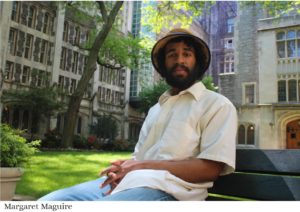about me
 To me, the most memorable part of Roots, the 1977 television mini-series, is something so seemingly mundane that many viewers may have forgotten it. Each time there was a transition to a new generation of characters, the figure from the older generation would explain to the younger one the story of their family’s journey.
To me, the most memorable part of Roots, the 1977 television mini-series, is something so seemingly mundane that many viewers may have forgotten it. Each time there was a transition to a new generation of characters, the figure from the older generation would explain to the younger one the story of their family’s journey.
An historical narrative like the one passed down by the descendants of Kunta Kente in Roots is what I have always longed to have in my own family, whose history I know very little about. Moreover, as a descendant of enslaved Africans myself, I personally understand the great difficulty in finding the past of a people who have been deemed to be without one. I know the profound power that is reclaimed when a history-less people unearth and retell their own stories. I know the epistemological anxiety that comes from frantically filling in the blanks of a White-washed past.
Many times, when I ask other Black people about our history, they say “we were kings and queens.” However, exactly which kings and queens we were they cannot tell me. Rather than state historical facts, we promote comfortable fictions. As a coping mechanism for dealing with the loss of our lineage, we search for greatness in absence.
This re-narration of the many unknown areas of Black history is a practice that I also frequently find myself falling into. It is to revive my own roots, for example, that I prefer not to call myself a journalist or anthropologist or storyteller but a griot, a West African social role that encompasses all of the above-listed labels in addition to historian, poet, musician, and singer.
I call myself griot because my passion for storytelling comes from the lack of stories by, about, and for my own people, who ironically originate from the land of the griots. I call myself griot because, like the griots, I believe that a story isn’t any good unless it has some poetry, some history, and some song. I call myself griot because I have seen the social role that my stories may play.
In 2018, a man whom I profiled for a magazine a couple of years earlier passed away. In the email sent out announcing his death and the plans for his funeral, a link to my story about him was attached at the end. It was only then that I realized that what I had written about him extended beyond my personal interest in an interesting man. My words were a memorial object, the opportunity for a community of loved ones to return back to a time when this man was still present.
In only 1,931 words, I had given him what so many of my ancestors had been denied: a legacy, and to his family and friends I gave what I have been denied: a history. My article made me that older generation, keeping alive a cast of characters from days gone by.
This is why I write.
This is why I teach.
This is why I film.
This is why I am griot.
d
This intro was a hug. For a handshake, click here.
